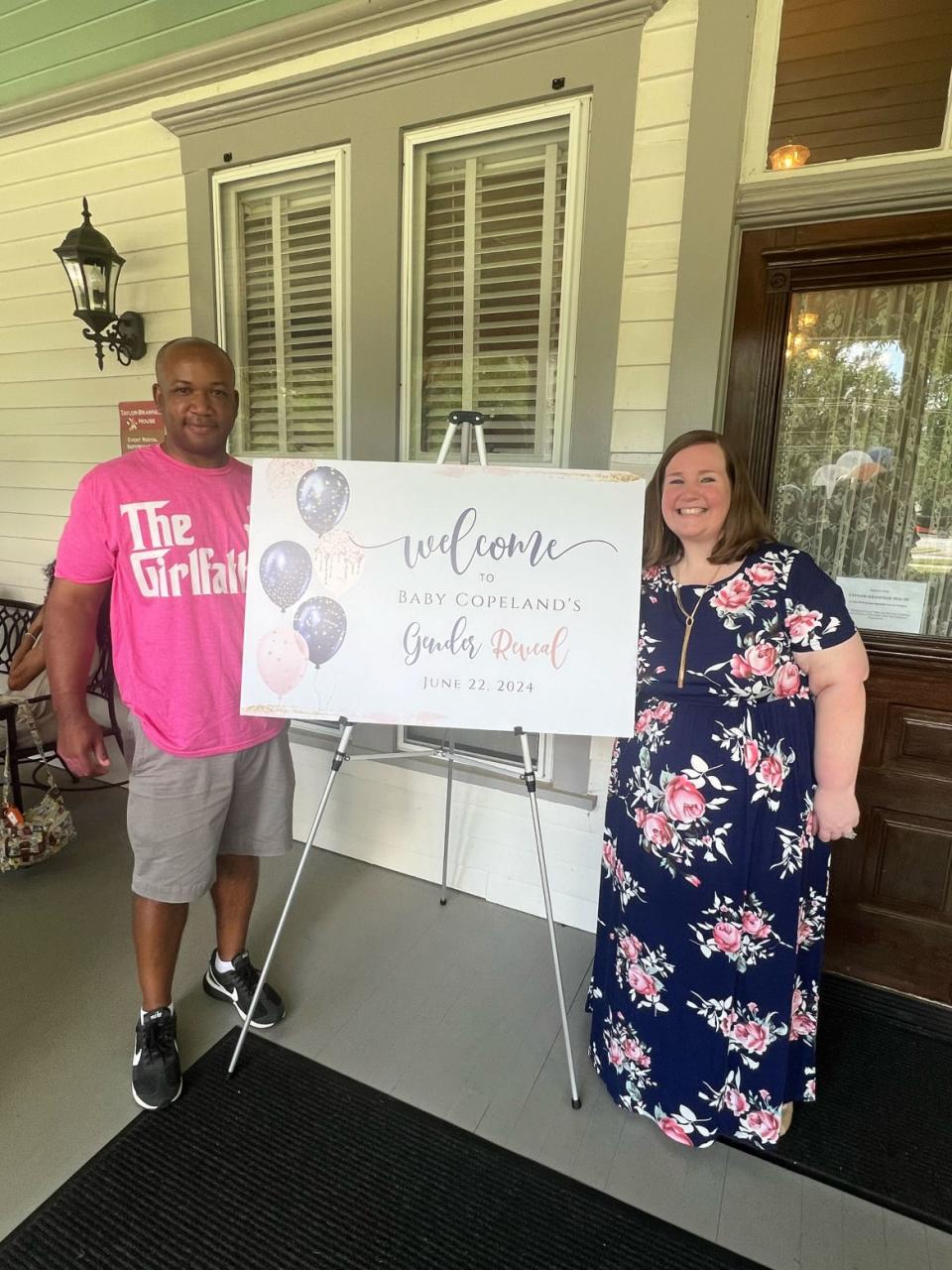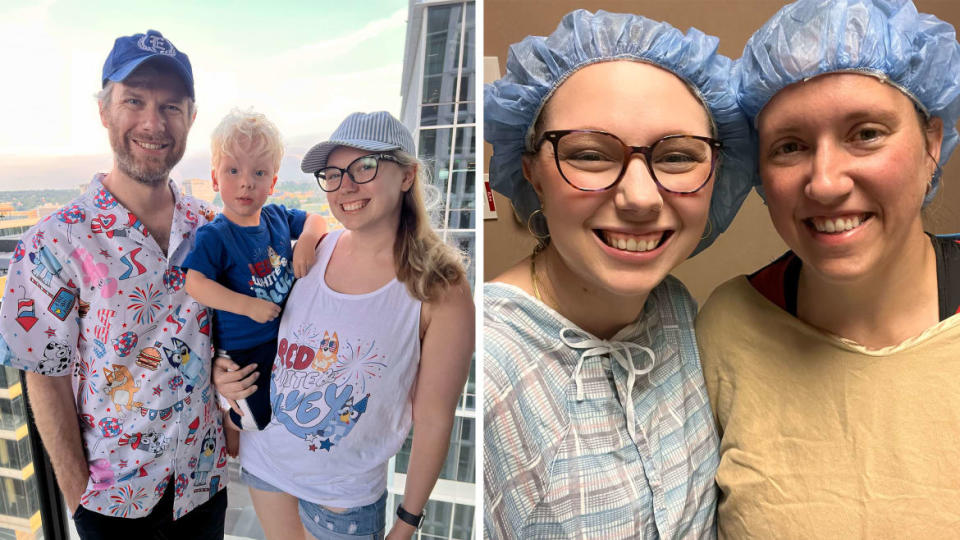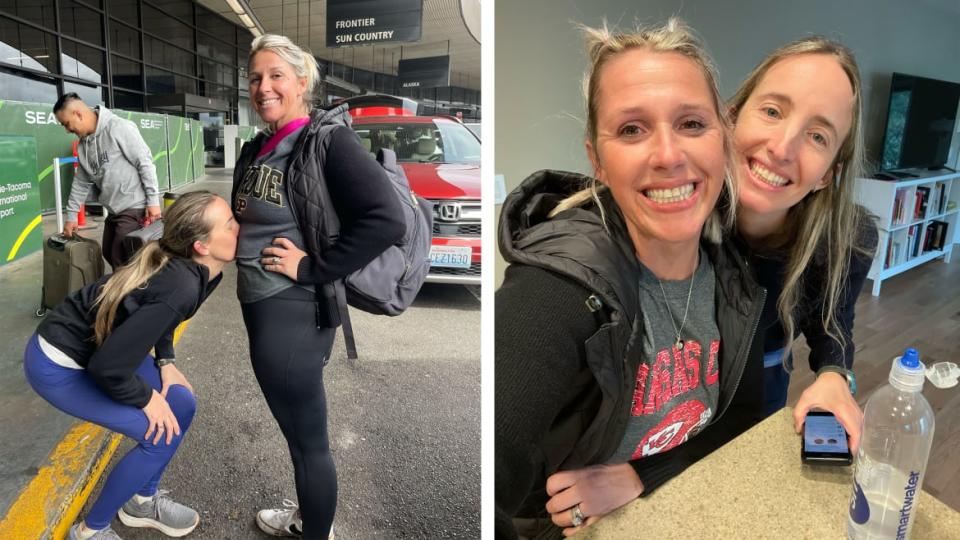Texas Surrogate ‘Scammer’ Goes Missing: Parents, Babies in Limbo

All Jenna Copeland and her husband wanted was a baby. After 10 grueling years of miscarriages and failed IVF treatments, they thought they had found the solution: a surrogate in Alabama to carry their final stored embryo to term, in exchange for a substantial fee.
The surrogate became pregnant in February, and the Copelands were preparing for their gender reveal party earlier this month when they received a devastating message: The escrow company they had contracted to pay their gestational surrogate—the woman carrying their now 20-week-old baby—was suddenly suspending operations. More than half of the $60,000 they saved to pay their surrogate was missing.
Three states over, in North Carolina, a surrogate who we’ll call Anna was 38 weeks pregnant with another couple’s baby when she got the news. Anna is a single mom with a three-year-old son, and her pregnancy had been so difficult it forced her to quit her full-time job. She depended on the regular payments from the biological parents to feed her son and reimburse her for medical bills. But now all that money was missing—and Anna still had another couple’s baby inside her.
“I’m trying to be patient and not sound like I'm money hungry,” she told The Daily Beast. “But I am very quickly eating through savings because I'm paying rent, I'm paying child care, I'm paying everyday bills that every human does.”
“Especially losing my job several months ago, there is now a feeling of dread,” she added.
An American Surrogate Had His Baby. Then Coronavirus Hit.
Surrogacy Escrow Account Managers, or SEAM, was until this month a widely respected escrow manager for couples using gestational surrogacy—that is, hiring another woman to carry their biological children. Intended parents often use specialty escrow services as a secure, reliable means of paying their surrogates and reimbursing them for medical bills. But the collapse of SEAM this month—and the disappearance of its owner, Dominique Side—has shattered that reputation and left hundreds of families and surrogates in limbo.
More than 250 intended parents and their surrogates, in the U.S. and internationally, are out millions of dollars since SEAM suddenly shut its doors on June 14. The Houston FBI is investigating, and at least one lawsuit has already been filed. But in the meantime, families with babies on the way have lost what is often the last of their savings, and surrogates are carrying their children with no guarantee of ever being paid.
“We didn't sign up for this,” Anna said of the chaos. “We wanted to help people out and help ourselves out at the same time. And now it's very stressful. Nobody has a straight answer.”
“Parents are lashing out at surrogates. Surrogates are lashing out at the intended parents,” she added. “It’s a very high tense, high stress, high anxiety situation.”
The parents: ‘I feel hopeless, terrified, angry’
Copeland and her husband, Roy, turned to surrogacy as a last resort, after suffering multiple miscarriages, an ectopic pregnancy, and three grueling, unsuccessful rounds of IVF. By the summer of 2022, the couple was down to their last stored embryo. “We consulted again with our infertility doctor and he said, ‘If you have the finances and the mental capacity, I would suggest using a surrogate for your last embryo,’” Copeland recalled.
The procedure was pricey—gestational surrogates in the U.S. range from $45,000 to $70,000 per pregnancy—and not without risks. Surrogacy in the U.S. exists in a sort of legal gray area, with no federal laws and a confusing patchwork of state legislation governing its use. Because of this, parents and surrogates are often governed by their own contracts, with varying levels of court enforcement. A Michigan couple, for example, was forced to adopt their biological child in 2021 after it was born via surrogacy. (The state updated its laws earlier this year).
But Copeland and her husband knew they had to try. The couple shopped around for a reputable surrogacy agency—a sort of third-party broker for the surrogacy process, which matches families with surrogates and helps write contracts—and landed on the Atlanta-based Family Makers. The agency suggested they create an account with SEAM to ensure their surrogate was paid on time and according to their contract.

Jenna and Roy Copeland at the gender reveal party they threw for their unborn child when they received the message the escrow company they had contracted to pay their gestational surrogate—the woman carrying their now 20-week-old baby—was suddenly suspending operations.
Family Makers President Ashlee Hammonds told The Daily Beast her agency had worked with SEAM since 2016 without incident, and recommended them because they were considered the “top escrow management service in the industry.” She added: “It’s absolutely heartbreaking that somebody could do this to [the families].”
In November of last year, Copeland and her husband deposited $60,000 in an escrow account managed by SEAM. They transferred their last embryo to their surrogate in February, and were delighted when the pregnancy took. For the next four months, SEAM paid their surrogate on time, and the Copelands focused on getting ready for the new baby.
Then, on June 1, their surrogate informed them she hadn’t been paid. At first, Copeland thought little of it—“I was like, ‘Let’s just keep an eye on it,’” she said. But a week passed without payment, and her surrogate started to get antsy. On June 11, Copeland received a message from Side saying Capital One had frozen the company’s accounts because of fraudulent charges, but that payments would resume soon. “We were like, OK, cool, it'll be worked out in a couple days,’” Copeland said.
On June 14, as Copeland and her husband busied themselves with preparations for the gender reveal, they received what would be their final communication from SEAM. Unlike the other messages, this one was short, curt, and light on details. “Due to legal action, I regret to inform you that all operations have been placed on hold,” the email said. “At this time, I am unable to provide further details regarding this matter.”
The Copelands were dumbfounded. “We were both like, ‘What the heck? What legal action is she talking about?’” Copeland said.
They haven’t heard from Side since.
This process repeated itself hundreds of times across the country, leaving intended parents stranded without the tens of thousands of dollars they’d put aside to pay their surrogates. Many of these parents had already suffered multiple miscarriages, failed IVF treatments, or thwarted attempts at adoption; others were unable to have children because of major health complications like cancer or hysterectomies. Several intended parents told The Daily Beast they’d taken out loans and even second mortgages to afford the process.
“I feel hopeless, terrified, angry,” said AnnaMaria Gallozzi, an intended parent from Austin who remortgaged her house. “We’ve hit every emotion that can happen inside of grief, except for acceptance. It’s so hard to accept that someone who was a surrogate herself could do this to her own community.”
Gallozzi, 33, turned to surrogacy after she was diagnosed with stage-four, metastatic breast cancer in 2019. She froze her eggs before starting chemotherapy and had a healthy baby boy through surrogacy the next year, using SEAM as her escrow manager. When she and her husband decided to try for another baby this year, they saw no issue with using the service again. They put close to $60,000 in escrow in April.

AnnaMaria Gallozzi and her husband had their first child (left) with their surrogate (right) Heather Hamlin.
When Gallozzi received the first email from Side earlier this month, her surrogate had just miscarried and the family was gearing up to try again. Gallozzi reached out to a SEAM employee to ask what was going on, but the woman told her all of the employees had just quit. “They were saying that they weren’t getting paid, and that things fell off, and they didn't want to be associated with it,” Gallozzi said. She got the final email from Side the next day.
“[My husband] immediately saw red,” she recalled, adding that she had tried to stay optimistic. “I was like, ‘Well, maybe she's just dumb. Maybe something happened.’”
“But now we both feel like our money is not there,” she said. “I've seen enough Netflix and Hulu documentaries to know that this does not feel good.”
The surrogates: ‘It’s nerve-wracking’
Anna, who asked not to use her real name because she is under an NDA with her intended parents, enrolled to be a surrogate two weeks after giving birth to her son. She had struggled for years with infertility, and after finally having a baby of her own, she said, “I was like, I have to do this for someone else. This is the most amazing thing.”
Her first surrogacy went swimmingly. She matched with a same-sex couple in Europe and had a relatively easy pregnancy that resulted in a healthy baby boy. She used the money from the surrogacy—deposited regularly by an escrow company into her bank account—to supplement her income working in administration and save for her son’s future.
But this pregnancy was different. The couple was once again a same-sex couple from Europe, but this time they rarely spoke to her, reaching out maybe once a month for updates. Even before the turmoil at SEAM, she said, she felt used for her body, like she wasn’t “part of the team to bring this baby into this world.” The process felt “very much like they want it to be more of a business transaction” she added, “rather than creating a life-long friendship.”
Making matters worse, the baby was in such an odd position that it pressed on her lungs and on a major vein in her back, making her blood pressure drop dramatically at random. She found herself passing out even while sitting down, and was rushed to the emergency room multiple times. The medical problems were so all-consuming that she was forced to quit her job, making her wholly reliant on the income from her intended parents. (To avoid situations like this, the American Society for Reproductive Medicine recommends screening surrogates to ensure they have stable employment and a supportive home environment. “We always say the surrogacy income should be the icing on the cake, but not the cake,” surrogacy attorney Stephanie Caballero told The Daily Beast.)
When her regular payment didn’t appear in her bank account on June 1, Anna figured it was just a temporary delay. But when her health insurance reimbursement failed to materialize on the 15th, she started to get suspicious. The next day, her agency called her to tell her about the shutdown. The payments weren’t late, they said—they just weren’t coming.

Arielle Minton kisses the bump of her surrogate Christena Doan.
That was the last communication Anna got from her agency. Her intended parents have been chattier since, she says, but made no mention of getting her the money. She is currently owed more than $25,000, she said, but that isn’t what she’s most worried about. Next week, she is scheduled to have a C-section—an invasive, often painful procedure that can run up to $35,000. All of her medical bills are in her name, and the money that was supposed to reimburse her is missing.
“Bills are now starting to come in from January that are going to collection,” she said. “They’re all in my name. They’re all my social security number. Everything associated with me is associated with those bills.”
“It’s very concerning, it’s very nerve wracking,” she said.
For every intended parent affected by the SEAM shutdown, there is a surrogate like Anna carrying their baby with no guarantees of getting paid. Not all of the surrogates are going totally without payment, and many parents are dipping into their savings to meet their financial obligations. But the missing funds are putting a strain on even the closest of surrogate-parent relationships.
Christena Doan, 42, lives in a small town in Indiana, and is carrying for a woman in Seattle whom she calls her “soul sister.” The pair talk every day, she said, but these days the conversations are fraught: The intended mother took out a loan in order to afford surrogacy, and now $38,000 of it—money Doan expected to receive in regular increments until she delivers this winter—is missing.
“[The intended parents] already paid that money and it’s terrible, but at the same time, I have to be compensated,” Doan said. “I put my body through a lot already, and then I’m going to be delivering a baby.”
Doan and another surrogate who spoke to The Daily Beast said they are negotiating a lower rate for their services and spacing out the payments over a longer period of time to help the parents afford it.
A few days ago, Doan said, she nearly cried when she realized her intended parents may never get their money back.
“But I said, ‘No matter what, you're taking this baby girl home when I deliver her. She’s yours,’” she said. “And that’s the light at the end of the tunnel.”
Dominique Side: ‘I love Dior, I shop Gucci’
On the surface, Dominique Side seems like a successful businesswoman with a heart of gold. On the SEAM website, the 44-year-old describes herself as a two-time surrogate who saw SEAM as a chance to help “hundreds of people create the families they wanted.” In her telling, she was approached by the owners of SEAM during her second surrogacy about helping run the company, then about taking it over. “It was a perfect way to transition into another aspect of a field that I so passionately advocate for,” she says.
But supporting surrogates was just one of her many passion projects. According to business records, she is the owner of 11 other companies, including a “luxe vegan clothing line” called Nikki Green, a “vegan consulting company,” called The Luxury Vegan, and a “sustainably engineered recording studio” called VGN BAE Music Group. In an interview with Voyage Houston in 2022, she claimed to have started “several multi-million-dollar businesses,” including a private middle and high school and the first “vegan supermarket” in Houston.

Dominique Side in since deleted social media posts.
On a since-deleted website for Nikki Green, Side described herself as a “powerful luxury fashion and vegan lifestyle influencer”; on another website, as a “serial entrepreneur and recording artist.” (The latter site appears to be for some sort of business coaching business, where Side sells one-on-one coaching calls and sold a $9.99 “Mindset Mastery eBook” on the “five pillars of entrepreneurial success.”)
In an interview last year with AfroTech, she said her dream was to “coach the person who is running the Fortune 500 company,” adding, “That’s where I feel like I can take my expertise.”
Side's media appearances and social media posts appear specifically designed to transmit a veneer of success. On Instagram, she posted glamorous photoshoots, ads for her upcoming performances, and snaps from her world travels. (On the day SEAM announced it had shut down operations, she posted on Instagram about her various trips to Europe.) In the AfroTech interview, she bragged about her expensive taste, telling the interviewer: “I love Dior. I shop Gucci, Celine, and these different designers.”
But the “serial entrepreneur” may have been less successful than she let on. Vegside Mkt, her vegan supermarket, shut its doors in September 2021. The private school she co-founded, Houston Sudbury School, shuttered in October 2022 after graduating just six students. The websites for Nikki Green and VGN Bae studios both went offline sometime this year; the website for The Luxury Vegan still says, “Coming soon.”
In March 2022, Harris County sued Side for failing to pay more than $15,000 in property taxes. When she failed to appear in court, the judge issued a default judgment and the county ordered the property sold at an auction.
In January of this year, according to a lawsuit filed in New York Supreme Court, the businesswoman took out a nearly $70,000 loan using SEAM’s future receivables of collateral. The agreement was arranged so that payments were automatically deducted from Side’s bank account, the suit alleges, but a month later, she blocked the lender from making any withdrawals. The lender, Pearl Delta Funding, sued Side and SEAM in March of this year. They settled shortly thereafter.
Undeterred, the entrepreneur allegedly took out another loan in May of this year, this time pledging $975,000 of multiple companies’ receivables to Dynasty Capital in exchange for a $650,000 cash payment, according to a suit filed by Dynasty in Monroe County Court. Side stopped making those payments, too, the suit claims, and Dynasty Capital filed suit on June 18—four days after SEAM sent its final email out to customers.
Since then, Side has deleted all of her personal social media accounts—including Facebook, Twitter, Instagram, and LinkedIn—and changed the name of several of her business accounts. Her personal website has also been taken down, as well as SEAM’s professional Facebook page. A real estate listing shows her recording studio was put up for sale on June 11.
Side did not respond to multiple calls, emails, and texts from The Daily Beast, and she is not represented by a lawyer on any current cases against her. The voicemail at SEAM’s office now offers callers a single menu option: Press one to leave a message about delayed payments. An automated voice then tells callers payments that payments will resume in a few days.
According to SEAM clients, it has not changed in weeks.
‘This woman has taken our joy—and run away with it’
Christopher Kettman, an intended parent in California, said he and his wife sold their cars and took out a home equity line of credit to afford surrogacy. The couple is paying their surrogate out of their savings, he said, but the money won’t last long.
“It’s tough to look at our savings account and see nothing and know there's another $40,000 that’s going to have to come from somewhere,” Kettman said. He, too, has started a GoFundMe to recoup some of the funds.
Gallozzi, meanwhile, is grappling with whether she can go forward with the transfer she had planned for August. She and her husband took out a second mortgage to afford the process, and with nearly $50,000 missing, they’re not sure they’ll be able to afford it—which may mean missing their chance to have a second child.
“My dream of being a parent felt hopeless when I got my cancer diagnosis. Surrogacy gave us that hope again,” said Gallozzi, who has also started a GoFundMe. “This woman has taken our joy, our hope, our compassion, and has run away with it.”
More than 700 intended parents and surrogates have joined a Facebook group for SEAM clients to organize their response. Members of the group have reported Side’s disappearance en masse to the Houston Police Department, FBI, and multiple state attorney general’s offices, and several have hired personal lawyers. Representatives for one intended parent served Side with a lawsuit alleging fraud and breach of contract Wednesday morning.
Houston FBI spokesperson Connor Hagan told The Daily Beast the Bureau is actively seeking possible victims, and encouraged anyone impacted to reach out. Houston Police Department spokesperson Victor Senties said the department had referred its investigation to the FBI, adding that there were “multiple complainants that go throughout the U.S., and other countries as well.”
Gallozzi has hired a lawyer, Andrew Bluebond, to advise her. Bluebond told The Daily Beast he thinks it's unlikely the clients will see any money from SEAM itself, but that the agents who referred clients to the escrow company could be liable. That makes for an awkward situation for intended parents, many of whom have come to rely on their agencies for support and guidance in the absence of any real regulation.
“Instead of having this great relationship with your surrogacy agency to guide you through what should be a really joyful process, everyone's put sort of uncomfortably at odds with each other,” Bluebond said.
The attorney attributed much of the problem to the lack of regulation in the surrogacy industry, calling the escrow accounts a “regulatory donut hole” where customary safety precautions don’t reach.
“If they were doing real estate, they would absolutely be covered by existing regulations. If they were doing finance, they would be covered by existing regulations,” he said. “But here—in this very sensitive subject matter that really could use some security—there's no regulation that reaches it.”
One surrogate, Haley Rexroat, told The Daily Beast she’d be hesitant to use escrow services again. She is 16 weeks pregnant and hasn’t been paid since May, though she and the intended parents are working on a modified payment schedule. “I had absolutely zero idea that there was no regulation on escrow accounts and who can manage escrow accounts,” she said. “[Escrow] is supposed to be there to mitigate all the risks—and then this happens.”
Anna, meanwhile, said she will never work as a surrogate again. Her family is coming into town next week to take care of her after the C-section, and afterward she will return to live with them in central Tennessee, where she will start work at five weeks post-partum in order to pay her medical bills.
She plans to speak with her agency about getting the compensation she is owed, she said, but doesn’t know how successful she will be.
“It feels very much like the people in charge of this industry like to take advantage of the people who are willing to help,” she told The Daily Beast.
“I will never talk bad about any couples wanting a baby,” she added. “But the people in charge of the fertility clinics, the agencies, the escrow account management—it feels very much like if you are not an intended parent, you don't really matter.”
Regardless of whether she is paid or not, however, she has no plans to do anything but hand the baby over to its intended parents.
“He has parents that want to love him and want to take care of him,” she said. “As long as they come and get the baby, that is all I care about.”
Get the Daily Beast's biggest scoops and scandals delivered right to your inbox. Sign up now.
Stay informed and gain unlimited access to the Daily Beast's unmatched reporting. Subscribe now.


